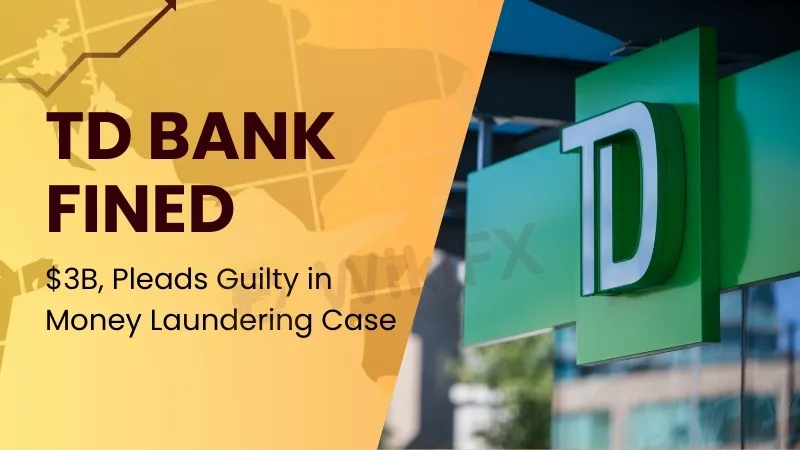简体中文
繁體中文
English
Pусский
日本語
ภาษาไทย
Tiếng Việt
Bahasa Indonesia
Español
हिन्दी
Filippiiniläinen
Français
Deutsch
Português
Türkçe
한국어
العربية
TD Bank Fined $3B, Pleads Guilty in Money Laundering Case
abstrak:TD Bank pleads guilty and agrees to a $3B fine for money laundering. The largest penalty for a bank; requires compliance upgrades and asset caps to prevent future issues.

TD Bank has been fined $3 billion by U.S. authorities after admitting to money laundering violations. This is the largest penalty ever given to a bank for such offenses, showing a serious breach of anti-money-laundering laws. U.S. prosecutors revealed that the Canadian bank's weak controls allowed criminals to use its services.
A Record Fine for TD Bank
The $3 billion fine is one of the biggest in banking history. Besides the fine, TD Bank also faces an “asset cap” from the Office of the Comptroller of the Currency (OCC), which limits the banks ability to grow. This is similar to a penalty given to Wells Fargo in 2018.
Prosecutors discovered that some TD Bank employees helped criminals from Colombia and other countries. These employees accepted bribes and ignored suspicious transactions. In one case, a man from Queens bribed bank staff with $57,000 in gift cards, allowing over $470 million to be laundered.
Compliance Problems Within TD Bank
TD Banks failure to follow U.S. banking rules was widely known by its employees. Internal emails showed staff were aware of illegal activities, but they took no action. For example, a branch manager emailed colleagues saying, “You guys really need to shut this down LOL,” but nothing was done.
The penalties were issued because TD Bank didn‘t have a proper anti-money laundering program and failed to report suspicious transactions. Between 2018 and April 2023, TD Bank didn’t monitor $18.3 trillion in transactions, creating a massive opportunity for money laundering.
Authorities Act Against TD Bank
U.S. prosecutors, the Federal Reserve, and the OCC worked together on the case. More than 24 people, including TD Bank insiders, also faced charges. Acting Comptroller of the Currency Michael J. Hsu said that TD Banks focus on growth, instead of safety controls, led to major violations. The asset cap is meant to push the bank to improve its controls before growing further.

This case is part of a larger crackdown on money laundering. The OCC made it clear that any bank ignoring compliance rules will face severe consequences, like the restrictions now on TD Bank. The asset cap will limit the banks growth until it fixes its compliance issues.
TD Banks Response and Next Steps
TD Banks U.S. legal chief, Cynthia Adams, pleaded guilty on behalf of the bank in a Federal District Court in Newark, New Jersey, before Judge Esther Salas. After the court decision, TD Bank promised to improve its money-laundering controls, stating it had spent over $500 million Canadian dollars (about $365 million USD) on new compliance systems.
CEO Bharat Masrani expressed regret over the scandal and said TD Bank will strengthen its anti-money-laundering program to prevent future problems. Chairman Alan MacGibbon added that the bank will hold responsible employees accountable.
In response to the fines, TD Bank sold 40.5 million shares of Charles Schwab stock to cover the expected penalties. This reduced TD Banks stake in Charles Schwab from 12% to just over 10%. The money-laundering scandal also led to TD Bank abandoning its plan to buy First Horizon Bank, as it struggled to get regulatory approval.
Impact on TD Banks Future
TD Bank, which has about 1,100 branches in both the U.S. and Canada, now faces the challenge of rebuilding its reputation. The fines and penalties send a strong message to the financial industry about the need to follow anti-money-laundering rules.
The legal action against TD Bank is a clear warning to banks, especially in the U.S., where compliance with regulations is becoming stricter. By settling the charges, TD Bank has agreed to hire an independent monitor to oversee its money-laundering controls, showing a move toward tighter oversight.
This case highlights how crucial proper monitoring and compliance are in maintaining trust with the public, investors, and regulators. People will be watching closely to see how TD Bank handles the aftermath of the largest money-laundering fine ever given to a bank.
Stay updated on the latest developments in the TD Bank money laundering case and other financial news.

Disclaimer:
Ang mga pananaw sa artikulong ito ay kumakatawan lamang sa mga personal na pananaw ng may-akda at hindi bumubuo ng payo sa pamumuhunan para sa platform na ito. Ang platform na ito ay hindi ginagarantiyahan ang kawastuhan, pagkakumpleto at pagiging maagap na impormasyon ng artikulo, o mananagot din para sa anumang pagkawala na sanhi ng paggamit o pag-asa ng impormasyon ng artikulo.
Broker ng WikiFX
Exchange Rate


